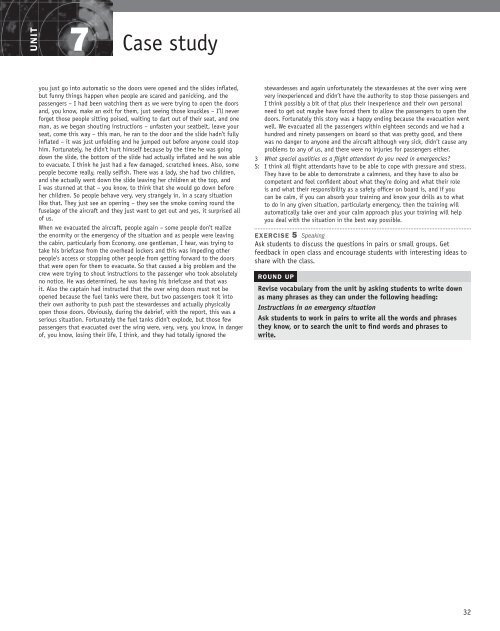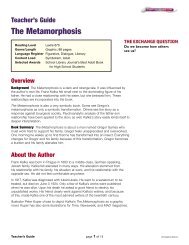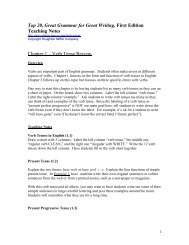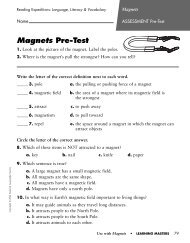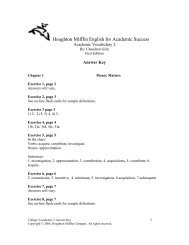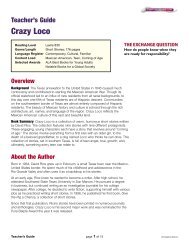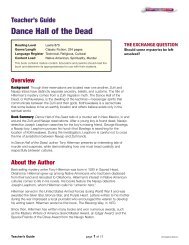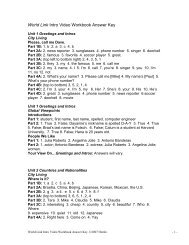English for Cabin Crew Trainer's Guide - Heinle
English for Cabin Crew Trainer's Guide - Heinle
English for Cabin Crew Trainer's Guide - Heinle
Create successful ePaper yourself
Turn your PDF publications into a flip-book with our unique Google optimized e-Paper software.
UNIT<br />
7 Case study<br />
you just go into automatic so the doors were opened and the slides infl ated,<br />
but funny things happen when people are scared and panicking, and the<br />
passengers – I had been watching them as we were trying to open the doors<br />
and, you know, make an exit <strong>for</strong> them, just seeing those knuckles – I’ll never<br />
<strong>for</strong>get those people sitting poised, waiting to dart out of their seat, and one<br />
man, as we began shouting instructions – unfasten your seatbelt, leave your<br />
seat, come this way – this man, he ran to the door and the slide hadn’t fully<br />
infl ated – it was just unfolding and he jumped out be<strong>for</strong>e anyone could stop<br />
him. Fortunately, he didn’t hurt himself because by the time he was going<br />
down the slide, the bottom of the slide had actually infl ated and he was able<br />
to evacuate. I think he just had a few damaged, scratched knees. Also, some<br />
people become really, really selfi sh. There was a lady, she had two children,<br />
and she actually went down the slide leaving her children at the top, and<br />
I was stunned at that – you know, to think that she would go down be<strong>for</strong>e<br />
her children. So people behave very, very strangely in, in a scary situation<br />
like that. They just see an opening – they see the smoke coming round the<br />
fuselage of the aircraft and they just want to get out and yes, it surprised all<br />
of us.<br />
When we evacuated the aircraft, people again – some people don’t realize<br />
the enormity or the emergency of the situation and as people were leaving<br />
the cabin, particularly from Economy, one gentleman, I hear, was trying to<br />
take his briefcase from the overhead lockers and this was impeding other<br />
people’s access or stopping other people from getting <strong>for</strong>ward to the doors<br />
that were open <strong>for</strong> them to evacuate. So that caused a big problem and the<br />
crew were trying to shout instructions to the passenger who took absolutely<br />
no notice. He was determined, he was having his briefcase and that was<br />
it. Also the captain had instructed that the over wing doors must not be<br />
opened because the fuel tanks were there, but two passengers took it into<br />
their own authority to push past the stewardesses and actually physically<br />
open those doors. Obviously, during the debrief, with the report, this was a<br />
serious situation. Fortunately the fuel tanks didn’t explode, but those few<br />
passengers that evacuated over the wing were, very, very, you know, in danger<br />
of, you know, losing their life, I think, and they had totally ignored the<br />
stewardesses and again un<strong>for</strong>tunately the stewardesses at the over wing were<br />
very inexperienced and didn’t have the authority to stop those passengers and<br />
I think possibly a bit of that plus their inexperience and their own personal<br />
need to get out maybe have <strong>for</strong>ced them to allow the passengers to open the<br />
doors. Fortunately this story was a happy ending because the evacuation went<br />
well. We evacuated all the passengers within eighteen seconds and we had a<br />
hundred and ninety passengers on board so that was pretty good, and there<br />
was no danger to anyone and the aircraft although very sick, didn’t cause any<br />
problems to any of us, and there were no injuries <strong>for</strong> passengers either.<br />
3 What special qualities as a fl ight attendant do you need in emergencies?<br />
S: I think all fl ight attendants have to be able to cope with pressure and stress.<br />
They have to be able to demonstrate a calmness, and they have to also be<br />
competent and feel confi dent about what they’re doing and what their role<br />
is and what their responsibility as a safety offi cer on board is, and if you<br />
can be calm, if you can absorb your training and know your drills as to what<br />
to do in any given situation, particularly emergency, then the training will<br />
automatically take over and your calm approach plus your training will help<br />
you deal with the situation in the best way possible.<br />
EXERCISE 5 Speaking<br />
Ask students to discuss the questions in pairs or small groups. Get<br />
feedback in open class and encourage students with interesting ideas to<br />
share with the class.<br />
ROUND UP<br />
Revise vocabulary from the unit by asking students to write down<br />
as many phrases as they can under the following heading:<br />
Instructions in an emergency situation<br />
Ask students to work in pairs to write all the words and phrases<br />
they know, or to search the unit to fi nd words and phrases to<br />
write.<br />
32


